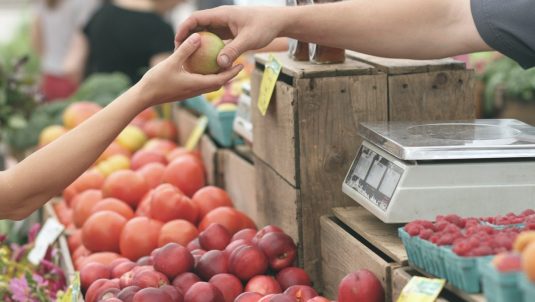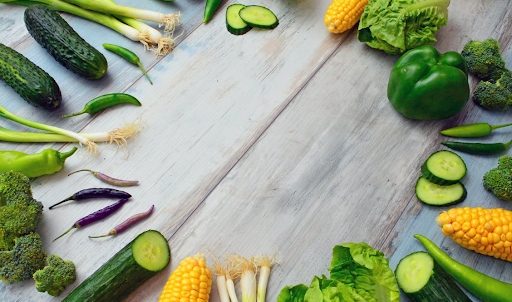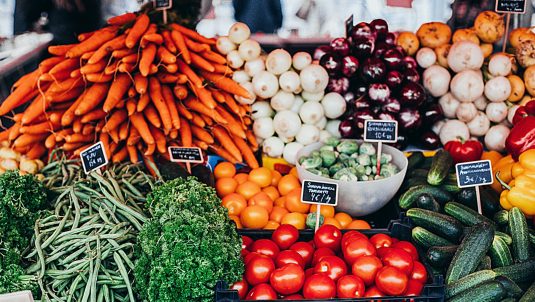How to Pick the Best Produce At The Farmers Market
It’s mid-summer, which means it’s peak organic farmers market season, and with quarantine measures being eased in many states, our favorite seasonal markets are finally able to open up and get back to the business of providing the public with fresh produce and goods. In this article, Organic Restaurants is going to discuss what a farmers market is and the benefits it provides to the local economy, and how you as a patron should go about picking the best products when shopping in order to maximize the value you get from the trip.
The Benefits of Shopping at the Farmers Market
Farmers markets are big business in the United States, and with more than 8600 registered farmers in the Farmers Market Coalition, there’s a strong chance that there’s at least one market that takes place locally for you. Why are these markets integral parts of the local community?
Help Support Local Farmers
New and experienced farmers alike gain access to additional revenue sources when they take part in local farmers markets. Because it’s extremely affordable to register and run a booth at local markets, farmers markets provide income streams to farmers that supplement other forms of revenue and allow them to test out new produce or products in a local market to gauge interest – if they find that they can affordably grow a new produce item for which the local economy has a high demand, they’ll be able to improve their own bottom line over time.
Educate the Consumer
How much do you actually know about the food that you eat that is purchased from the grocery store, other than the nutritional information on the label? Do you know the ingredients? Could you use those ingredients in new and exciting ways? The fact is, shopping at an organic food market empowers consumers to take control of the foods they eat and learn how to eat better. Farmers markets are great ways for farmers to share recipes and educate consumers on how to use produce and fresh goods in healthier ways, creating a baseline for a healthier lifestyle. Over time, shopping at the farmers market will shift consumer behavior and further improve the local economy by boosting a major contributing business.
Improve and Support the Local Community
There’s a completely different vibe to shopping at a farmers market than how we approach shopping at the grocery store. The sense of community connection that evolves over time between patrons of the farmers market is an evolving form of the connection mentioned above with the farmer. We begin to learn from one another, get ideas for recipes and new dishes, we share our own, and over time we increase social interactions to the point that the farmers market becomes a social gathering that we look forward to rather than a mechanical shopping trip to be dreaded.
Better Value
Farmers are bringing products and produce to the markets that they need to sell, and they need to maximize their profitability. This means that they are likely bringing the highest quality and freshest possible products to market, and that produce has traveled from the farm to the market. Meanwhile, produce bought at the grocery store can have traveled as far as 1,200 miles before it reaches the shelves. So when you purchase responsibly according to your own consumption needs, you will not have to worry about whether or not the produce will keep until you use it, as it is as fresh as it can possibly be.
Picking the Best Produce at the Market
While we’ve established that the produce you find at the market is far superior to that sitting on the shelves at the grocery store, you should still approach your farmers market shopping trip with some basic foundational strategies in mind.
Be Mindful of COVID-19 Protocols
While the most stringent guidelines have been lifted in many markets, there are still pandemic guidelines that must be followed in public settings that apply to farmers markets. Call ahead or check the market’s website to find out how your local farmer’s market is adhering to CDC guidelines. Chances are at this point there will not be any sampling or cooking demos, and the ability to check or touch produce before you purchase it is likely to be either not allowed or severely limited. In some venues, you might have to wear a mask in order to enter, and there will almost certainly be restrictions on the number of patrons allowed to enter. Do your research and plan ahead for the best possible experience.
Stay Focused on Seasonal Products and Shop With a Menu in Mind
Our ability to buy almost any type of produce year-round at the grocery store tends to make us forget that produce is seasonal. Knowing your local vendors and what produce should be available during the time of the year you’re shopping should help you both know what to expect to see on the shelves at the market and what to avoid since it’s likely been purchased wholesale for resale. Avoiding out of season produce helps ensure you’ll be buying only the freshest product.
Going into the market with a plan will also help you get the best value out of your trip. Rather than going in blind and buying produce willy nilly, shopping with an established menu in hand means that you’ll only buy what you need, and nothing will go to waste on your own shelves or in your refrigerator.
Understand What Makes Veggies and Fruit Last Longer
Produce in the store has been trimmed and treated and primped and made as beautiful as it’s going to ever be in order to entice you to buy it. Unfortunately, all of this makes for produce that goes bad extremely quickly. While farmers market vendors will sometimes trim stems and emulate what you see in the grocery stores, look for produce that is whole and unmarred, as you will get the longest shelf life in these cases.
Shop Smarter, Not Harder
Be strategic in your shopping trip, especially since there will likely be additional guidelines in place that might limit your time at the market. Since you have already made a list, do a quick walk of the market to identify which vendors have the best mix of quality and price so that you maximize the value of your purchases.
The Farmers Market is Your Pathway to a Healthier Life
At Organic Restaurants, we talk a lot about how restaurants can improve the quality of the food they serve by partnering with local farmers and purveyors in order to source fresh ingredients over preprocessed goods. Farmers markets provide the general public with the ability to ensure that you’re able to do the same thing for yourself in your own home. Supporting your local farmers market also shows farmers the value of investing in and being active in their community, and they will do more to support both the general community and local restaurants, as they will find it creates an extremely profitable feedback loop and helps the community at the same time. It is our goal at Organic Restaurants to bridge these gaps in the community by linking diners craving a healthier restaurant experience with restaurants that focus on organic menu offerings. By nurturing and encouraging healthier eating patterns, all parties will in turn seek out relationships with local farmers.
Find restaurants with organic options near you
Search by city or see restaurants close to you.






 Sign in with Google
Sign in with Google Sign in with Facebook
Sign in with Facebook